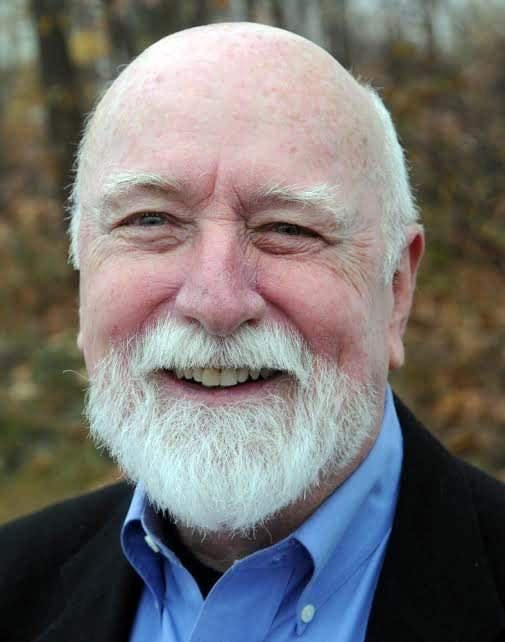The Observer: How to parent now? It was much simpler 50 years ago
- Oops!Something went wrong.Please try again later.
The word “parent” is a noun with a lot of verb in it. I used to be one. Technically I still am, although I’m no longer active. I am a retired parent. I have gone from being a practicing Dad, enmeshed in the scrum and scramble of family life, to being a wide-eyed witness to parenthood as practiced by others.
For the record, it might be helpful to know that my wife and I raised six sons. These wonderful men are all in their 40s and 50s now; each of them a father himself. I suppose some might think this personal history puts me in a position to give advice to those who actively parent today. It doesn’t — although you can skip to the end of this column to read someone else’s wise words about children and parenting.

The truth is that when we were rearing our children, it was a different era. Raising kids 50 years ago was relatively simple compared to doing it in the 2020s. In the 1970s and 1980s, there were no cellphones, no internet or web pages; no Facebook, Twitter or TikTok; no AI, deep fakes or cyber-bullying; no catfishing, ghosting, or swatting; no vaping, legal cannabis or $1,000 concert tickets.
It wasn’t “Little House on the Prairie,” but it wasn’t “The Matrix” either. In those halcyon days, there were very few models of how to parent. There were really just three or four common approaches according to research done at the time.
Last week, The Irish Times published an article on parenting in Ireland (irishtimes.com/health/your-family). It resonated with me. Written by Sheila Wayman, the article describes three traditional models of parenting; the authoritative, the authoritarian, and the permissive. This typology was proposed in the 1960s by developmental psychologist Diana Baumrind. Twenty years later Eleanor Maccoby and John Martin suggested a fourth option; what they called “neglectful parenting.”
The Observer: Remembering Milt Davis- Professor, doctor, mentor and friend
The article says that “authoritative parents set boundaries with a child but offer plenty of warm connection too.” In contrast, “authoritarian parenting focuses on discipline and control with little consideration of emotional needs.”
And “permissive parenting prioritizes warm connection but is lax on limits.”
Regarding the “neglectful” approach — akin to what is sometimes called “free range” parenting today — the article concludes that it “meets a child’s basic physical needs but has little regard for socio-emotional aspects.” Out of the four, it seems that traditionally — in Ireland anyway — the authoritative model was “regarded as the most desirable with studies linking this type of parenting to better child outcomes.”
Today, of course, we think about many more approaches to parenting than these four.
Psychotherapist Stella O’Malley proposed a fifth type: “ultra responsive” parenting. In this category, she places those parents who respond to “every little nick in their [child’s] skin, every little hive, every little cry, every smile.”
Nowadays, we might think of this as helicopter/snowplow/drone parenting as pursued by those who anticipate their child’s every conceivable need and who will do whatever it takes to achieve success.
I suspect this “ultra responsive” approach is more common and normative today although it was virtually unknown in our long-ago days as parents. We were much more laissez-faire as parents than most parents are today. Modern parents might look at us as irresponsible. Ours were good kids who became good men, good fathers.
I suppose our parenting was essentially authoritative but with a touch of free-range thrown in. “Go outside,” we’d say. “Come home when you hear the dinner bell.” We thought of this as fostering healthy independence and it did.
The Observer: The real, the unreal and the surreal
Popular culture today has identified numerous other styles of parenting. In addition to helicopter parenting and free-range parenting, the literature identifies: dolphin, elephant, jellyfish, koala and tiger models along with other non-zoological metaphors. All are discussed in Wayman’s Irish Times piece.
What’s a parent to do nowadays? How can parents know what kind of parent to be? We took our inspiration from Kahlil Gibran’s masterwork “The Prophet.” In it Gibran speaks to parents in this way: “Your children are not your children. They are the sons and daughters of Life’s longing for itself. They come through you but not from you. And though they are with you yet they belong not to you,” he writes. “You may strive to be like them but seek not to make them like you.”
This wisdom was published 100 years ago. I think it still holds.
Ron McAllister is a sociologist and writer who lives in York.
This article originally appeared on Portsmouth Herald: The Observer: How to parent now? It was much simpler 50 years ago